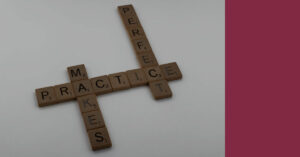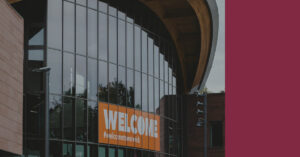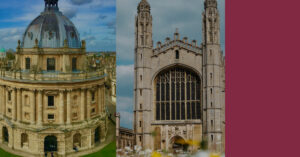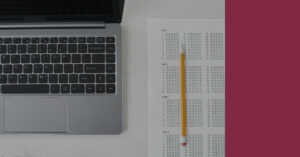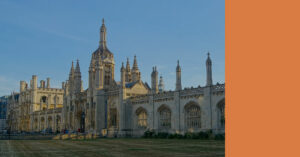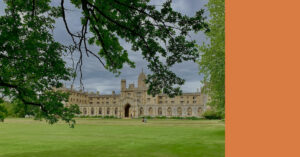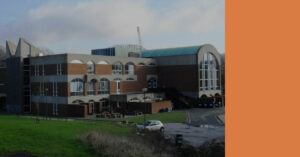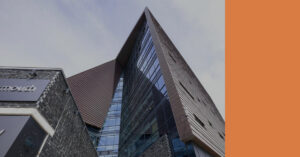Welcome to our UK Medical School Review series. In this series, we work with current students to produce an in-depth overview of each UK Medical School, covering what it is like to study there, how the course looks and what you need to get in.
Today, we are focussing on Birmingham Medical School, in the City of a Thousand Trades, or Brum if you will. Sumayyah, a Birmingham Medic, shares her experiences and insights as a current student.
Let’s get started with an overview of Birmingham Medical School…
Overview Of Birmingham Medical School
About Birmingham Medical School
Birmingham Medical School beginnings date back to 1825 when Mr Sands Cox, a local surgeon, started anatomical demonstrations. The school is one of the oldest and largest British Medical Schools. By 1828, the school was comprised of a lecture theatre and museum/dissecting room. Then, in 1841, the Queen’s Hospital opened for teaching and then rest is quite literally history.
Birmingham Medical School Alumni
Birmingham Medical School is now a world-famous school for teaching Medical and Dental Sciences. Due to its historical prowess in the world of medicine and from having amazing facilities, it comes as no surprise that a number of alumni are fairly notable. Notable alumni include Leon Abrams, who developed and implanted the first variable-rate heart pacemaker, Peter Weissberg, the former Medical Director of the British Heart Foundation and Sir Harry Gilbert Barling.
Birmingham
Medical School
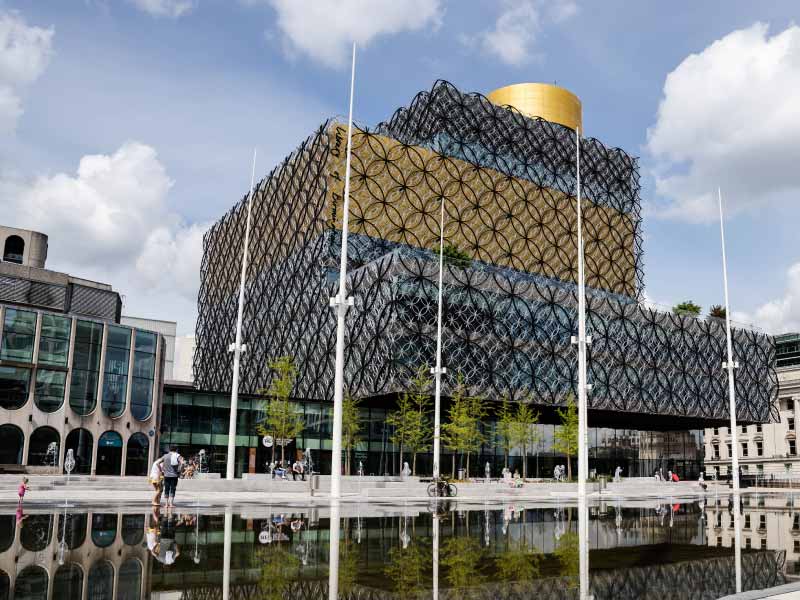
- University Age: 197
- UK Ranking: 26th
- Pint Price: £2.85
- Alumni Notability: 8/10
- A-level Requirements: A*AA
- Places Available: 350
- Applicant Success Rate: 11%
- Teaching Style: EBL
- Interview Style: MMIs
- Admissions Test: UCAT
Why did you choose to study at Birmingham?
“The university itself has been around a long time, with a good reputation. I have family who went to UoB so I knew I could trust the university with my own degree. They also have good connections with a range of hospitals around the city and lecturers, many of whom work at the hospitals.
The university is in the same city as home which means I commute. It means I have the freedom to go out and do as I like, while simultaneously saving some money living at home. It also has a mix of students from a range of ethnicities, backgrounds etc. I knew this would help me feel more comfortable settling in, whilst allowing me the chance to meet new people and have a range of different experiences.”

What is the best thing and worst thing about Birmingham Medical School?
“The best thing is the range of teaching styles and variety of lecturers – from very young to older, males and females, different ethnicities. It’s nice to see. I like the inclusivity which they have with prayer rooms, showering facilities, halal and vegetarian/vegan food. They host a range of events for people that drink, those that don’t drink and those that don’t go into clubs etc.
Medical School Rankings
The following link will take you to the Complete University Guide Medicine League Table. Here, you can see that Birmingham Medical School takes the 26th position with an overall score of 95%:
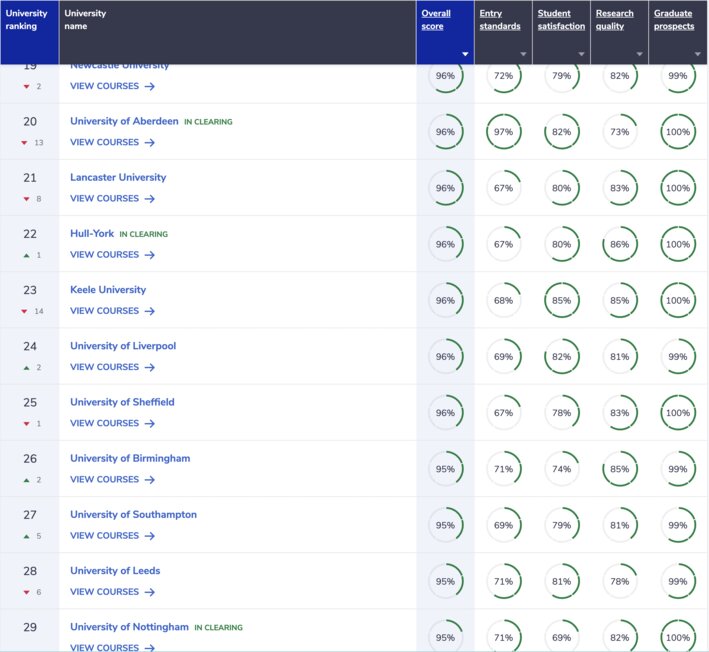
The table also highlights 99% graduate prospects for Birmingham Medics so there’s little to worry about once you graduate!
Rankings will, of course, differ between other tables; the Guardian includes different aspects to the Complete University Guide. When making your own decision on which table to look at, think about what you place more importance on, such as spending per student or career prospects. Keep in mind that all Medical Schools are highly ranked with excellent ratings across the board.
Birmingham Medical School Fees And Financial Support
The yearly tuition fees for Medicine and Surgery is £9,250 for home students and £26,640 (pre-clinical years 1 and 2) then £44,100 (clinical years 3, 4 and 5) for international students. Tuition fee loans are offered to all UK students by the Government and cover the course fees in full. Fees do not have to be paid upfront.
Funding For International Students
As stated on the Birmingham Uni website, they work in partnership with your home countries in order to provide you with the funds necessary to complete your studies and enjoy university life. For example, for US students, Birmingham is approved by the US Department of Education to offer the William D Ford Federal Direct Loan (Direct Loan) Program, enabling eligible American students to access financial support.
Birmingham Scholarships, Grants and Bursaries
Birmingham offer scholarships, grants and bursaries to their students. There are multiple scholarships including for music and sports.
Bursaries
The Chamberlain Award is available to new applicants belonging to one of the following groups:
- If your household income is below £25,000.
- If you successfully complete a Pathways to Birmingham programme and your household income is below £60,000.
- If your household income is below £60,000 and you are resident in a Low Progression Neighbourhood (defined as a Polar 4 quintile 1 area) when applying to study at Birmingham, as recorded on your UCAS application.
What are the living costs like?
“Firstly, it’s £2.87 per pint on average, but this, of course, depends on where you’re buying it from. Public transport is also dependent on the type of pass and where you’re using it. The city is split into 5 zones.
- Bus pass for a term is £160.
- Bus and train pass to be used in zones 1 and 2, for a term is £233.
- Bus and train pass to be used in zones 1 to 5, for a term is £275.
- The other alternative is to pay monthly which can be beneficial if you know you won’t need the pass at all during the Christmas/Easter holidays. Then, it can be anywhere between £40 and £70 a month.”

Earn your offer at Birmingham with support from 6med.
Get full, comprehensive support for your medical school application with 6med’s Complete Bundle. Access everything you need for success as soon as you sign up.
UCAT.Ninja
UCAT.Ninja
Not sure where to start with your Medical School application?
Our Complete Bundle provides support for your Personal Statement, UCAT, BMAT and Interview and guides you to a successful application.
With our Complete Bundle, we guarantee that you will get at least one offer to study Medicine, or your money back.
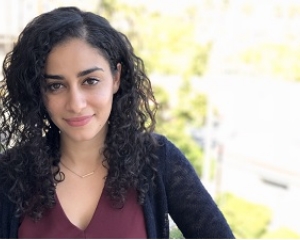

What Is Studying at birmingham medical school Like?
Medicine at Birmingham is taught through lectures, tutorials, practical classes, bedside demonstrations and clinical experience. There is also a small component of problem-based learning (PBL).
The teaching style will be different to what you are used to as a great deal of learning is from student selected enquiry-based learning. This style is all about posing questions, problems or scenarios to students, rather than simply presenting facts or providing a smooth path to knowledge. Students are more in charge of their own learning and must identify and research issues and questions to develop their knowledge. This form of learning is in addition to the usual structured teaching sessions.
Many students prefer this style because it is the opportunity to graduate as a more effective and independent learner, whilst also being supported to reach this stage. Birmingham also exposes you to amazing facilities and a lot of contact hours with patients (aside from enquiry-based learning, a significant part of your learning takes place on clinical placements).
The image below gives you an idea of the contact hours for the MBChB degree.
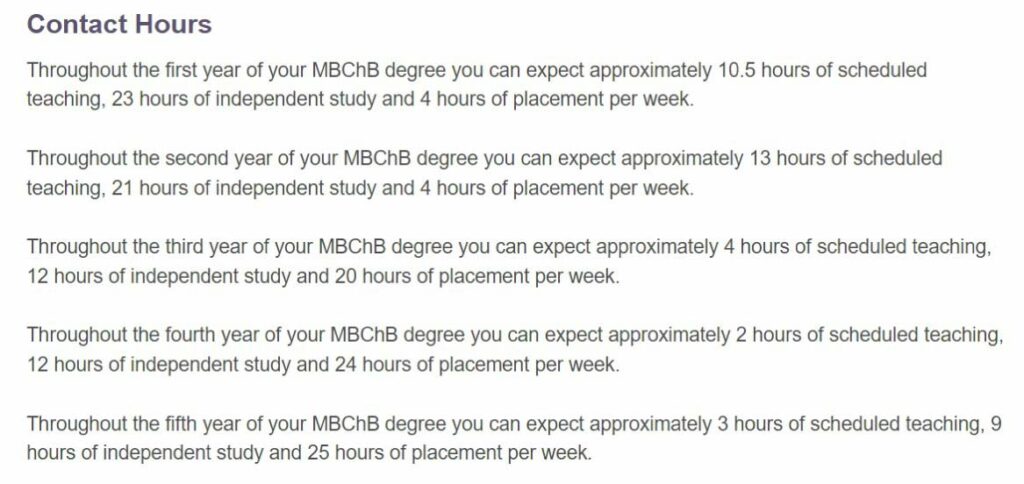
Birmingham assesses their students in a variety of ways. This includes:
- Single Best Answer Multiple Choice Questions (SBA MCQ)
- Short Answer Questions (SAQ)
- Written Examinations
- Clinical Competency Examinations
- Appraisal of Professional Behaviour and Attitudes
- Oral Examinations
- Essays
- Presentations
- Conference Poster presentations
- Teaching session and report
- Reports

Degree Content
There are two Medicine courses offered at Birmingham. The first is the Medicine and Surgery MBChB
Undergraduate Course.
Undergraduate Medicine Course
The Undergrad Course programme lasts 5 years with the option of doing an intercalated programme. If you perform well during your degree, you can take advantage of the internationally competitive research within Birmingham Medical School through an in-depth study of chosen topics for one year, leading to the award of a Batchelor’s degree.
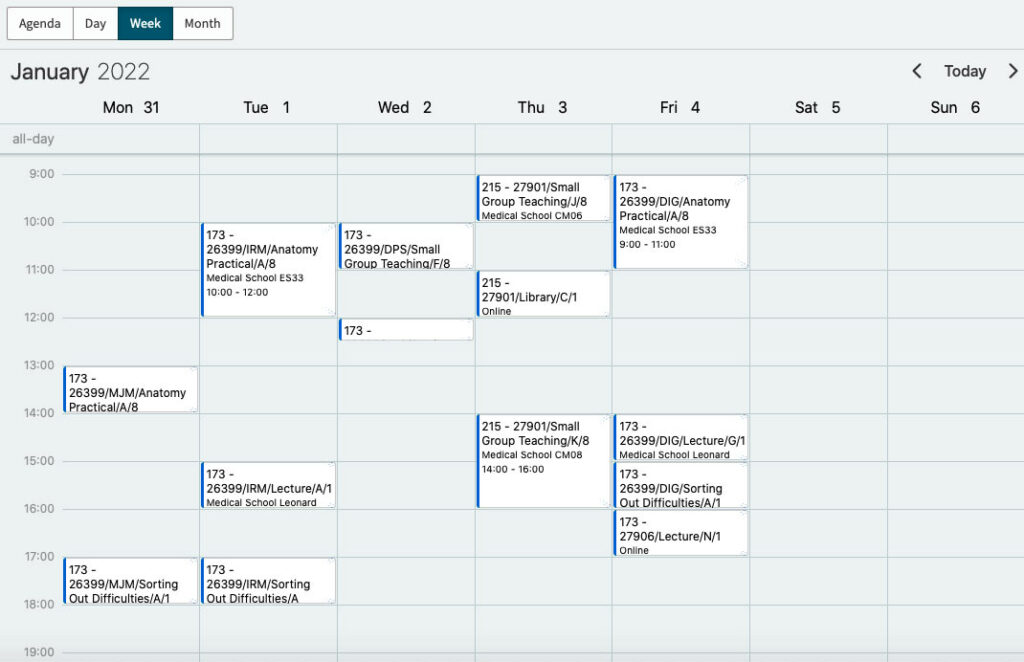
Below is a summary of the curriculum across the 5 years:
Summary of the curriculum:
First Year
- Basic Life Support
- Community Based Medicine 1 (GP placement)
- Foundations of Medical Science and Practice 1: Cell Science, Endocrinology, Neurones and Society
- Foundations of Medical Science and Practice 2: Health Behaviours, Musculoskeletal, Respiratory and Digestive Systems
- Professional and Academic Skills 1
- Regional Anatomy 1
Second Year
- Community Based Medicine 2
- Foundations of Medical Science and Practice 3: Immunology, Health Care Provision, Cardiovascular and Renal Science
- Foundations of Medical Science and Practice 4: Brain, Decision Making, Reproduction and Cancer
- Professional and Academic Skills 2
- Regional Anatomy 2
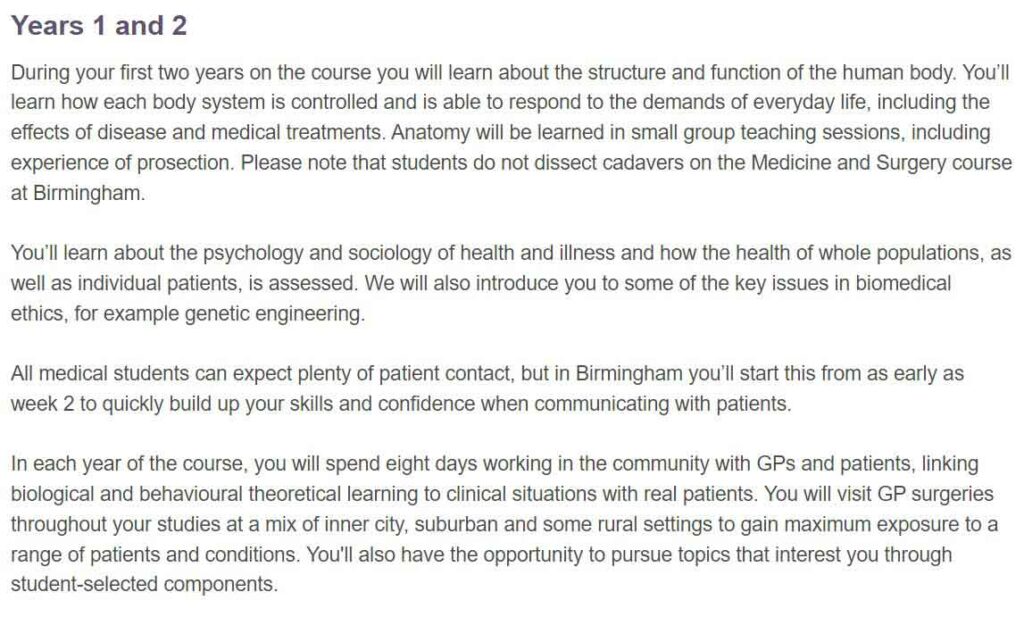
Third Year
- Clinical Core 2: Hospital Based Medicine and Surgery and Community Based Medicine
- Evidence Based Medicine and Research Methods
- Health Improvement Evidence Review Project: a group project that reviews the evidence for a treatment chosen by the group
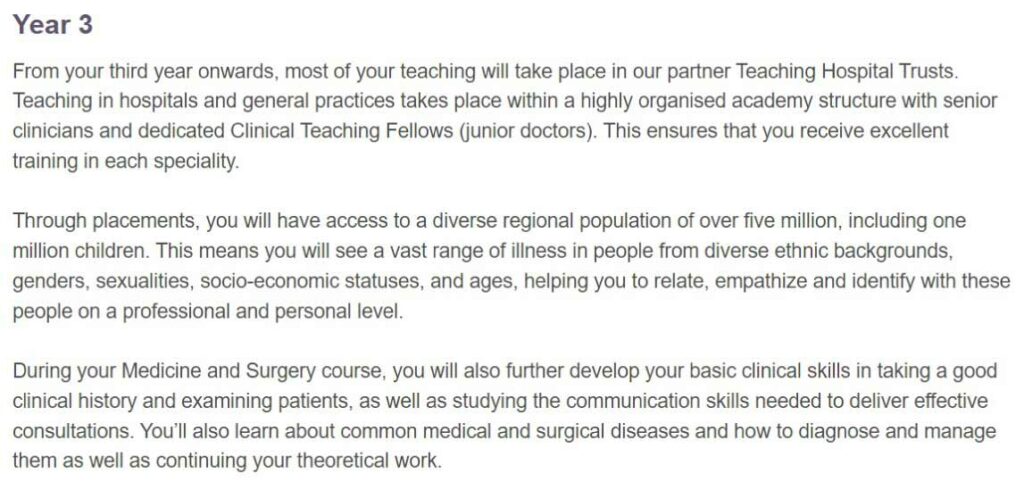
Fourth Year
- Clinical Core 3: anaesthetics, cardiology, community based medicine, dermatology, diabetes, ENT, endocrinology, gastroenterology, genito-urinary medicine, geriatrics, hepatology, nephrology, neurology, oncology, ophthalmology, orthopaedics, palliative medicine, psychiatry, radiology, respiratory, rheumatology, urology.
- Conference Poster Presentation: you present the findings of a quality improvement project you have undertaken
- Learning and Teaching project: you learn how to teach your peers
- Elective Preparation
Fith Year
- Clinical Core 4: medicine and surgery, obstetrics and gynaecology, paediatrics, general practice
- Ethics and Law in Clinical Practice: based on a case you have seen which raised ethical or legal difficulties
- Written Professional Communication: a group project looking at the various ways in which doctors communicate in writing

The other Medical Course is the Medicine and Surgery MBChB Graduate Course.
The Graduate Course lasts for 4 years. All modules can be found here.
The Dentistry Course lasts for 5 years and it provides students with a wide variety of opportunities to learn essential and advanced skills to excel in Dentistry. The course also gives students early contact with patients in as early as first year.
What Makes Birmingham Medical School Unique?
What makes Birmingham Medical School unique?
“The teaching style is unique. Particularly since Covid-19. There is a real mix of face to face lectures, pre-recorded lectures, Zoom sessions, small group teachings and self directed learning sessions. I really enjoy the mix as I feel it always has me on my feet, and my brain engaged.
Even the lectures are in a range of different formats. The pre-recorded ones are sometimes 1-2 hours long. Other times they are 7-10 segments of 10-15 minutes per segment. The way they have their syllabus organised is also nice and particularly unique. We have different modules per semester but they’re not divided up by parts of the body per say. Rather we look at systems and the body’s involvement. For example, in semester 1 we had a module on neurons and synapses. This allowed us to explore how neurons affect the entire body system. In semester 2 we have a whole module on muscles, joints and movement. Again, an important system which really affects almost the whole body.
In terms of the university itself, I also like the campus and think the integration of red brick buildings, modern buildings and green space gives the campus quite a special feel. It allows a small community to thrive in its own space whilst being only a 6 minute train ride away from the city centre.”
Birmingham Medical School Entry Requirements
| Exam | Undergraduate Medicine |
|---|---|
| A-levels | A*AA – With predicted AAA including Biology and Chemistry |
| IB | Higher level: 7,6,6 from Chemistry and Biology and one other approved subject. Standard level: The subjects must include English and Mathematics if not offered at the higher level (Maths Studies is acceptable). Minimum of 32 points must be attained |
| Exam | Graduate Medicine |
|---|---|
| GCSEs | Minimum of 4 GCSEs at grade C/4 or above, including English Language, Mathematics and either Biology and Chemistry, Combined Science or Science and Additional Science |
| Degree | Upper second-class honours in your first degree in any subject |
| Exam | Undergraduate Dentistry |
|---|---|
| A-levels | AAA – A levels must include Chemistry and Biology. |
| IB | 6, 6, 6 at Higher Level (to include Chemistry and Biology) with a minimum of 32 points overall. |
| Graduate Entry | Graduates must have achieved 2:1 in a health science related degree (or 65% average if unclassified degree), and a minimum of ABB at A level to include Chemistry and Biology plus one other. You must also offer a minimum of GCSE grade C in Maths and English. |

Not sure where to start with your Medical School application?
Our Complete Bundle provides support for your Personal Statement, UCAT, BMAT and Interview, all designed to guide you to a successful application.
Personal Statement Crash Course
Personal Statement Crash Course
Medical School application causing you confusion?
Our Complete Bundle provides support for your Personal Statement, UCAT, BMAT and Interview and guides you to a successful application.
With our Complete Bundle, we guarantee that you will get at least one offer to study Medicine, or your money back.


Birmingham Medical School Personal Statement
Birmingham wants you to have a broad understanding of the medical profession. The Uni suggests that they are not testing students on their factual knowledge, but rather assessing applicants on their values. A good place to start is knowing the NHS Core Values and GMC Good Medical Practice.
Therefore, in your Personal Statement, we suggest that you show understanding and demonstrate the different qualities of a good doctor.
Any relevant work experience you have undertaken is necessary as it will show your commitment to learning and your understanding of healthcare settings. If you struggle to complete any work experience, then other experiences such as voluntary work, hobbies or part-time jobs will demonstrate your development of the skills required to be a doctor, and emphasise that you are more than just your textbooks!
It’s important to remember that don’t have to do it all alone. It can be extremely beneficial to get advice or feedback during your writing process. 6med’s Personal Statement Bundle provides you with constant support throughout the entire process to ensure your write a winning personal statement!
Birmingham Medical School Admissions Tests
UCAT
Birmingham suggests that there isn’t a minimum UCAT cut-off score and that your total score from the subtests (not including SJT) will be ranked with fellow applicants. Scores are then segregated into separate deciles. Although Birmingham state that there isn’t a UCAT cut-off score, they do mention that in 2020, the threshold total score for selection for interview was 2640.
The UCAT only makes up 30% of your application. This is important to know as Birmingham scores applicants using a weighted score where academic grades (e.g. GCSEs and A-levels) make up 70% of your application. This means that although your UCAT score is taken into account, it only forms a smaller part of your overall applicant score to be selected for Birmingham interviews.
Birmingham Medical School Interview
MMI Interview Style
Each year, Birmingham interviews around 1,400 applicants for the Undergrad degree and make 850 offers. During the pandemic, the University has used online interviews which last around 30 mins which are still similar to the in-person MMI style they normally use. Here is the interview format for online interviews and in-person interviews:
Online Interviews:
The online interviews are around 30 minutes long and there are multiple stations that last between 6-10 minutes. Here are some of the stations:
- Dealing with personal and ethical challenges
- Role play
- Calculation station
Face-To-Face MMI Interviews:
The face-to-face interviews (which the University normally uses outside of the pandemic) consist of seven 6 minute stations. Here are some of the stations:
- Interaction in a social setting
- Critical thinking
- Two calculation stations
- Motivation and insight into medicine
- Dealing with personal and ethical challenges
- Interaction in a healthcare setting
Example Birmingham Medical School Questions:
- Why would you like to study Medicine at the University of Birmingham? (2018)
- A prospective medical student has requested your advice on whether to apply to study Medicine and in particular whether s/he should apply to Birmingham Medical School. Over the next 6 minutes, discuss with the student their plans and whether they should apply to Birmingham Medical School. (2019)
- Tell us about the GMC? (2020)
- What are the demands placed on doctors? (2021)
- Review the table/graph enclosed and explain your findings. (2019)
- Why do you want to be a doctor, not a nurse? (2021)
- What health issues do you think doctors cannot control in our area? (2018)
- What have you struggled with? What do you think you will struggle with at medical school? (2020)
- Read this article on the proposed sugar tax. What are your thoughts? (2019)
- Speak to an actor, who has come into the GP practice to discuss his low mood over the past 3 months. (2020)
- Should organ donation be opt-in or opt-out in the UK? (2021)
- A friend of yours has repeatedly missed university due to “illness”. On Instagram, you see them away on a party holiday in Toulouse, meaning they have missed hospital clinics for 1 week. What do you do? (2020)
Birmingham uses MMIs to allow applicants to demonstrate a range of skills including: motivation for medicine, communication, reflection, ability to evaluate information, empathy, self-insight, ethical reasoning, data analysis and interpretation.
Interview Scoring
In previous years, an offer is made based on the interview performance data as well as a score derived from your SJT result from the UCAT. A total score is made up from 1/7th of your scores on each of the interview/role play stations (which comes to 5/7 of all components), 1/7th from the mean score of the two calculation stations (so 6/7 of all components) and then the final 1/7 from the UCAT SJT results.
Don’t forget that the other four UCAT sections are used but just to select those to invite to interview. The same goes for your academic achievements.
If you want to practice your MMI skills, you can sign up for 6med’s Interview Bundle to get invited to a live MMI Crash Course. You’ll also get access to tonnes of other helpful resources!
Extra-Curriculars at Birmingham Medical School
Outside of study time, what do most people get up to?
“The Guild – they’re essentially the student union. They have student services focusing on a range of areas from social media to mental health, exam tips to supporting societies to run. They host a range of events from Christmas countdown events to tours of the university to nights out and more. They’re integral to the smooth running of student life on campus.
Bristol Road – a 15 minute walk away from the medical school and just 10 minutes from the main library, this road is full of useful spots. It includes an Aldi, Costa, a range of food places from Indian takeaways to grilled food, noodles and more.
Broad Street – the social spot in the city centre. Often the road on which social events a hosted, there is a range of clubs and pubs from Rosies to Snobs, 1565 Bar & Terrace and Marmalade. Often, if there is a pub hop event, it’ll happen on this road.
Medical society – hosts a range of societies. Within the campus, there are over 400 societies that can be joined. And a whole host under med soc. These include GP soc, surgery soc, anatomy soc, sports socs, and socs just to socialise!”
What is the Birmingham accommodation like?
“I stayed in the accommodation called Ashcroft which is located in Pritchartts park accommodation village. I chose this accommodation and accommodation village as it was only a 6-minute walk away from the medical school. Additionally, it was self catered and had shared bathrooms which fit my price range perfectly.
I loved my time in this accommodation because I made some of my best friends from university there. There are also student mentors available with accommodation who are there to provide individual and flat support in regards to living away from university. There are also opportunities for socials within accommodation such as campus bars, quizzes or organising trips to the Harry Potter Studios like in my first year of university. There are other accommodation villages such as The Vale and Selly Oak, as well as partner accommodation that all provide similar services in the first year of university, but vary in terms of distance to the medical school and price.”
Birmingham Medical School Contact
Email: [email protected]
Postal address:
Birmingham Medical School
College of Medical and Dental Sciences
University of Birmingham
Edgbaston
Birmingham
B15 2TT
Advice for Birmingham medical school applicants
What advice would you give to a first-year student starting at your Medical School?
“Try to not get scared by how huge the campus is! And the silent study spaces aren’t as daunting as they seem. It doesn’t matter if you’re a first, third or final year student, you’ll always have things to do, you’ll be busy and your list of tasks/work to do is no less valid than anyone else’s. If anything, the older years are always so happy to help so approach them and ask for help and tips. Find out what worked well for them, how they revised and what they think the high yield topics are when exam season comes around!
I’d also say don’t cram. You physically cannot cram Medicine, it won’t do you any good – nor for your future patients. Learn as you go along, revise as you go along and you’ll realise that you then have time to incorporate activities and hobbies into your timetable.
Medicine is long, it’s a 5-year degree plus more. It’s a marathon – so most importantly, pace yourself. Don’t burn out too early.”
Check out our other UK Medical School Reviews:

Earn your offer at Birmingham with support from 6med.
Get full, comprehensive support for your medical school application with 6med’s Complete Bundle. Access everything you need for success as soon as you sign up.
MMI Interview Crash Course
MMI Interview Crash Course
Not sure where to start with your Medical School application?
Our Complete Bundle provides support for your Personal Statement, UCAT, BMAT and Interview and guides you to a successful application.
With our Complete Bundle, we guarantee that you will get at least one offer to study Medicine, or your money back.







